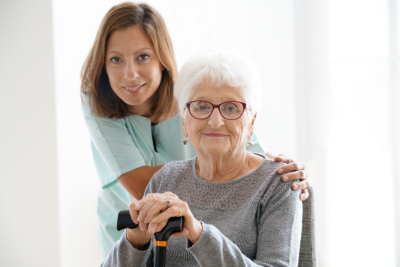
As our loved ones age, they may begin to face challenges in their daily lives that were once routine tasks. These challenges could be early indicators that they need assistance to maintain their independence and quality of life. In this blog post, we will discuss how to recognize the signs that an elderly loved one may need help and how early intervention can make a difference in preserving their independence for as long as possible.
Recognizing the Signs of Aging:
- Memory Issues: Occasional forgetfulness is normal as we age, but when memory problems become more frequent or severe, it may be an early sign of cognitive decline or dementia. Watch for signs such as:
- Frequently misplacing items
- Repeating questions or stories
- Confusion about time, dates, or locations
- Difficulty following instructions or completing tasks
- Mobility Challenges: Mobility issues can put seniors at an increased risk of falls and accidents. Look for these indicators:
- Unsteady gait or balance problems
- Difficulty standing up from a seated position
- Using furniture or walls for support when walking
- Reluctance to walk or move around
- Changes in Personal Hygiene and Household Upkeep: Declines in personal care and housekeeping may indicate that your loved one is struggling with daily activities. Be aware of the following signs:
- Unkempt appearances, such as disheveled hair, dirty clothes, or body odor
- Neglect of household chores, like laundry, dishes, or cleaning
- Expired or spoiled food in the refrigerator
- Unopened mail or bills piling up
- Social Withdrawal: Social isolation can have a significant impact on an older adult’s mental and emotional well-being. Take note if your loved one:
- No longer participates in activities they once enjoyed
- Avoids social events or gatherings
- Rarely leaves the house
- Appears lonely or expresses feelings of isolation
- Emotional or Behavioral Changes: Shifts in mood or behavior can also signal that an elderly loved one needs support. Be on the lookout for:
- Increased irritability or agitation
- Unexplained mood swings or tearfulness
- Loss of interest in hobbies or activities
- Signs of depression or anxiety
The Importance of Early Intervention:
If you notice any of these signs in your aging loved one, addressing the issue as soon as possible is essential. Early intervention can help seniors maintain their independence and prevent further decline in their physical and mental health. Here are some steps you can take:
- Open a dialogue: Have a gentle, empathetic conversation with your loved one about the changes you’ve observed. Express your concern for their well-being and discuss potential solutions to address their needs.
- Schedule a medical evaluation: Encourage your loved one to see their healthcare provider for a thorough evaluation. This can help identify underlying health issues and recommend appropriate interventions.
- Explore support services: Investigate available resources, such as in-home care services, senior centers, and adult day programs, to help your loved one maintain their independence and enhance their quality of life.
- Address safety concerns: Work together to create a safe living environment by making necessary modifications to the home, such as installing grab bars, improving lighting, and removing tripping hazards.
- Encourage social engagement: Help your loved one find opportunities for social interaction, whether it’s through organized events, support groups, or simply spending more time with family and friends.
Conclusion:
Recognizing the signs of aging and when to seek help is crucial in ensuring that our elderly loved ones receive the support they need to maintain their independence and well-being. By being proactive and addressing these concerns early on, we can make a significant difference in the lives of our aging family
If you are looking for more information or need assistance with home care services for your aging loved one, don’t hesitate to reach out to our compassionate and professional team at A New Day Home Care. We’re here to help guide you through the process and provide the support your loved one needs. Call us today at 714-476-7608 to discuss how we can tailor our services to meet your unique needs and help your loved one continue living a fulfilling and independent life.





Leave a Reply